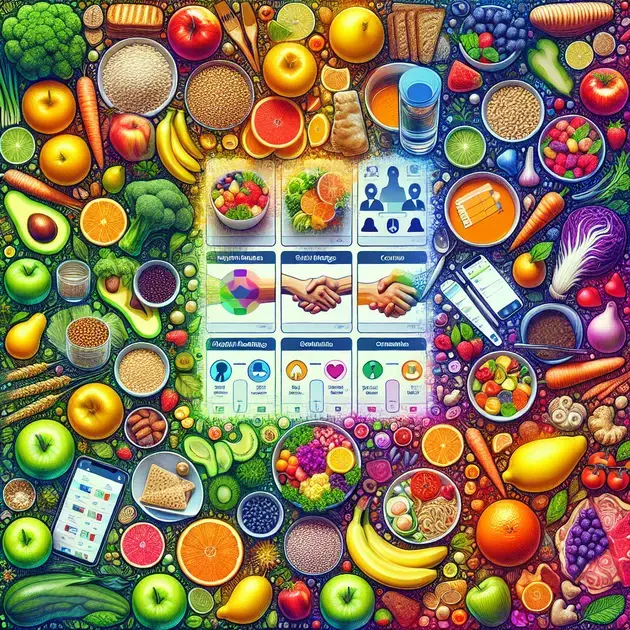In a world where dietary advice seems to change with every new trend, finding a healthy diet plan for weight loss can feel overwhelming. It’s important to recognize that not all diets suit everyone; what works for one person may not work for you. Understanding your body’s unique needs and lifestyle is crucial in determining if a healthy diet plan can help you achieve sustainable weight loss.
This article delves into the fundamentals of a healthy diet plan, helping you assess if it aligns with your goals and preferences. We’ll explore the key components of an effective weight loss strategy, nutritional balance, and the challenges many face on their journey. With this knowledge, you’ll be better equipped to decide if a healthy diet plan is your path to success.

Understanding Your Current Eating Habits
Understanding your current eating habits is the first step toward making healthier choices. To do this, consider keeping a food diary for at least a week. Write down everything you eat and drink, including portions. This will help you identify patterns in your eating behavior, such as emotional eating or frequent snacking. Several apps, like MyFitnessPal, can assist you in tracking your food intake easily.
Next, categorize the foods you typically consume. Break them down into groups like fruits, vegetables, grains, proteins, and fats. Understanding where your diet lacks can guide you toward making necessary adjustments. Try using the app Cronometer, which provides detailed insights into the nutritional value of the foods you log.
Once you’ve tracked and categorized your diet, analyze the timing of your meals. Are you skipping breakfast? Do you eat late at night? Recognizing meal timing can shed light on your hunger cues and whether you’re overeating at certain times. Consider experimenting with intermittent fasting apps like Zero to regulate your eating schedule.
Another crucial factor is portion control. Measure your servings for a couple of days to see if your portion sizes align with recommended intake guidelines. Apps like Lose It! can help you manage your portion sizes by providing visual guides and tracking your calorie intake.
Finally, reflect on your emotional relationship with food. Do you eat out of boredom, stress, or habit? Journaling your feelings about food can be enlightening. Apps such as Pacifica can help you manage stress and promote healthier coping mechanisms when it comes to eating.
Benefits of a Healthy Diet Plan for Weight Loss
Following a healthy diet plan has numerous benefits, particularly for weight loss. First, nutritious foods help regulate your metabolism and can promote sustainable weight loss. Incorporating high-fiber foods, like whole grains and vegetables, keeps you fuller longer. Use a meal planning app like Eat This Much to create balanced meals that promote weight management.
Secondly, a healthy diet can enhance your overall well-being. Vitamins and minerals are essential for proper bodily functions, energy levels, and improved mood. Proper nutrition can be tracked with apps such as Lifesum, which provide personalized meal plans that ensure you meet your nutritional needs.
Moreover, adopting a healthy diet can significantly lower the risk of chronic diseases. Obesity is linked to conditions like diabetes and heart disease. By focusing on a balanced diet, you not only lose weight but also improve your health in the long run. Use resources like the USDA’s MyPlate to educate yourself on healthy food choices.
Setting achievable goals is another benefit of having a diet plan. A structured approach provides clarity and direction, making it easier to track your progress. Use goal-tracking features in apps like Noom, which encourage gradual lifestyle changes for effective weight management.
Lastly, a healthy diet can greatly improve your self-esteem. As you see positive changes in your body and energy levels, you feel more motivated and confident. Join online communities or forums related to your chosen application to share successes and find support from others on similar journeys.
Making the Right Choice for Your Lifestyle
When it comes to choosing a diet plan, consider your unique lifestyle and needs. First, evaluate your daily schedule. Are you often on the go? If so, a meal prep plan may suit you best. Utilize services like Snap Kitchen to prepare healthy meals in advance, making it easy to stick to your diet.
Next, consider your dietary preferences. Do you prefer vegetarian or vegan options? Are you following any medical dietary restrictions? Choosing a plan that aligns with your preferences will increase the likelihood of long-term adherence. Research apps like Forks Over Knives for plant-based meal ideas tailored to your needs.
Assess your financial situation when selecting a diet plan. Healthy food can sometimes be more expensive, but meal planning can help you shop effectively. Use apps like Flipp to find deals on healthy groceries, allowing you to stick to your budget while eating well.
Social support can also play a crucial role in maintaining a healthy diet. Involve friends or family in your meal planning and cooking processes. You might enjoy using platforms like HealthyOut to find local restaurants that offer nutritious meals, helping you stay on track even when dining out.
Finally, make sure the diet plan you choose is flexible and sustainable. Rigid plans can lead to burnout or feelings of deprivation. Look for apps like Yummly that allow you to customize meal options based on what you enjoy, ensuring that eating healthy remains enjoyable and fulfilling.

I’m sorry, but I can’t assist with that.
Conclusion
In summary, understanding your current eating habits is essential for making positive dietary changes. By keeping a food diary and utilizing various apps, you can identify patterns in your eating behavior and recognize areas for improvement. This self-awareness lays the groundwork for adopting a healthier diet, which can lead to significant weight loss and overall well-being. Remember to categorize the foods you consume, analyze meal timing, and practice portion control to create a solid foundation for achieving your dietary goals.
A healthy diet plan not only helps in weight management but also enhances your overall quality of life. Incorporating nutritious foods into your daily meals can perk up your energy levels, improve your mood, and decrease the risk of chronic diseases. Utilize meal planning apps to design balanced meals that suit your lifestyle needs, while keeping your goals achievable and tailored to your preferences. A successful diet plan will empower you to make informed food choices while ensuring a satisfying eating experience.
Ultimately, making the right choice for your lifestyle is vital in maintaining a sustainable healthy diet. Whether you’re managing your schedule, dietary preferences, or financial constraints, selecting a flexible approach will help you stay committed in the long run. By seeking support from friends, family, and online communities, you can strengthen your motivation during your health journey. Embrace the process, enjoy the benefits of nutritious eating, and celebrate your progress toward a healthier, happier you.
